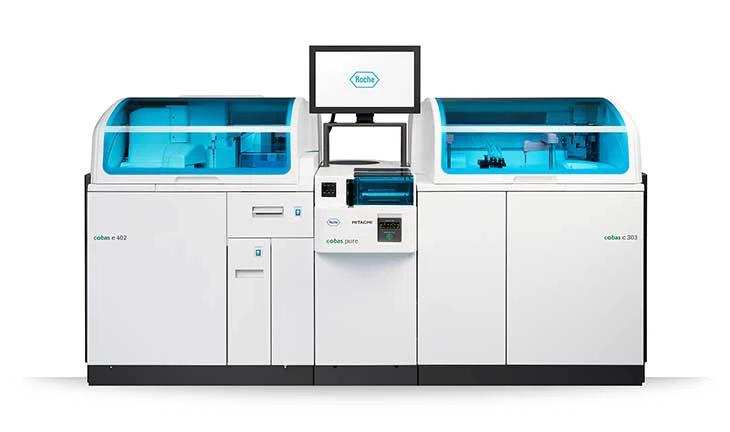A biochemistry analyzer employs the photoelectric colorimetric principle to quantify specific chemical components in bodily fluids. Owing to advancements in science and technology, formerly bulky benchtop clinical chemistry analyzers are evolving into smaller, more compact, and user-friendly devices.
The Indiko Plus Clinical Chemistry Analyzer, presented by Jant Pharmacal Corporation, stands as a cost-effective In Vitro Diagnostic Regulation (IVDR)-compliant solution tailored for small to medium-sized laboratories.
Engineered to deliver swift and precise results, it utilizes top-tier reagents specifically for drugs of abuse testing, making it an efficient choice for laboratories seeking reliable performance in a streamlined package.
The following are the advantages of using this analyser.
-
Less blood samples required
This biochemistry machine facilitates easier blood collection, especially for children and the elderly, as it requires just 100ul of blood. Its built-in centrifuge allows convenient testing using whole blood, plasma, or serum directly.
-
Rapid testing
Following blood collection, the sample is directly inserted into the biochemistry machine, eliminating the need for pre-processing or additional diluent, as required by larger clinical chemistry analysers.
With a swift 12-minute turnaround time and an integrated thermal printer, this enhances patient throughput, minimizing wait times and boosting clinic or hospital efficiency.
-
Easy to operate
As explained, this portable chemistry analyser is entirely automated, requiring no pre-processing or dilution. Its user-friendly design ensures simplicity, allowing test doctors, including non-specialists, to operate it effortlessly after basic training, eliminating concerns about handling complex instruments.
-
Accurate results
Concerned about the accuracy of the portable biochemistry analyser’s test results? The built-in real-time quality control system further enhances the accuracy of biochemical testing, providing added confidence in results.
-
Compact and portable
Despite its numerous internal components, this instrument is remarkably simple. With a compact size of approximately 0.015m³, just 1/20 of larger clinical biochemistry analysers, and a weight of only 5kg, it conserves valuable space in hospitals and clinics.
Furthermore, its RS-232 interface facilitates seamless data management by linking to the hospital’s LIS laboratory information system.
-
Less maintenance
The biochemical machine is both user-friendly and easily maintainable due to its thoughtful design. Devoid of liquid circuits, pumps, and valves, the absence of wearing parts minimizes maintenance requirements.
Further, the use of single-serving and disposable biochemical reagent trays eliminates the need for instrument cleaning, streamlining usability and maintenance for efficient and hassle-free operation.
-
Rich testing items
The biochemical reagents for this instrument cover a wide range, including:
Liver and kidney function
- Blood glucose
- Lipids
- Electrolytes
- Pancreas
- Heart muscle
- Coagulation.
Conclusion
You must understand the different types of chemistry analysers and how to choose the best one for your needs. The biochemistry analyser offers a multitude of advantages, including:
- Minimal blood sample requirements for easier collection
- Rapid 12-minute testing with integrated thermal printing
- User-friendly automation suitable for non-specialists
- Heightened result accuracy through real-time quality control
- Compact and portable design
- Low maintenance due to a thoughtful lack of wearing parts.
With a comprehensive range of 33 testing items, it stands as an efficient, accurate, and user-friendly solution for diverse clinical needs in hospitals and clinics.






